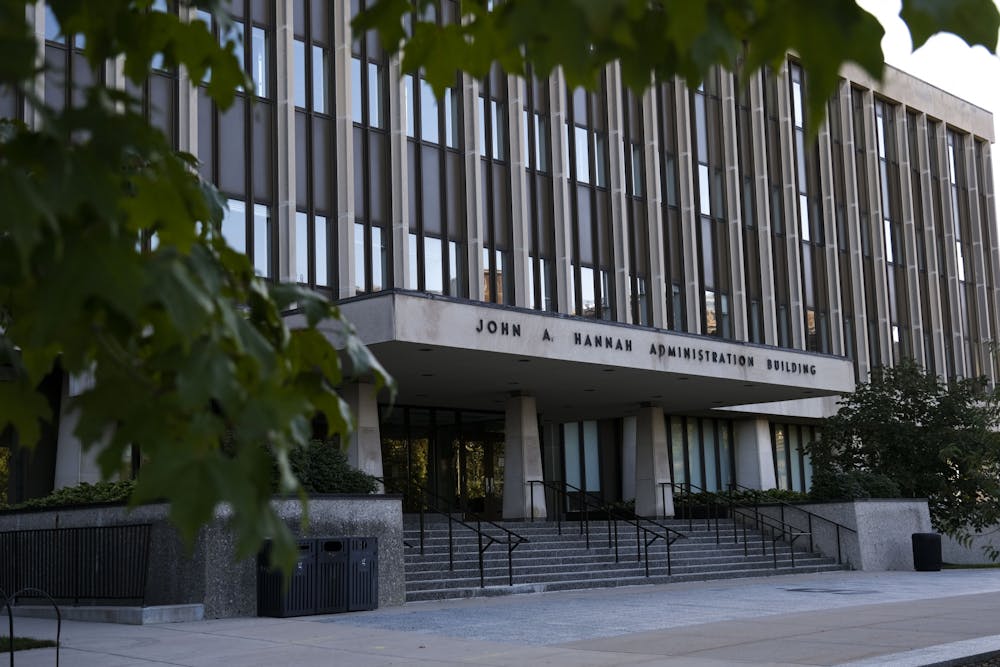An ongoing review of Michigan State University’s accreditation is pressing the school to prove it’s making real efforts to stomp out the board interference and donor influence that has brought so much scandal in recent years.
Publicly, MSU and its accreditor have said little about the probe, but copies of MSU’s correspondence with the accreditor and experts on the process provide new insight into what can be expected of the possibly years-long review.
It likely won’t end with MSU’s accreditation being revoked or even major sanctions on the school, experts say. But, the university will have to convince the national oversight organization that it’s stopping the widespread misconduct revealed by a new report.
The challenge to the school’s status was spurred by allegations of impropriety by board members.
Their actions — and the contentious board infighting that has surrounded it — has divided the university for months now, with a costly outside investigation, numerous votes of “no confidence” in the board, and, most recently, a widespread poll finding over 96% of faculty would like to see them removed from office.
The accreditation was put under review in November, when MSU’s faculty senate filed a complaint with the accreditor, citing allegations that then-board chair Rema Vassar was regularly interfering in the business of the administration and accepting gifts from a prominent MSU donor.
The university filed a response in January, acknowledging in a private letter that Vassar’s actions had jeopardized its status and committing to make changes to avoid sanctions going forward.
Then last month, an outside investigation ordered by MSU greatly expanded the array of known misconduct by Vassar and another trustee, Dennis Denno.
The most revelatory findings, about both Vassar and Denno, are in the areas of most concern for MSU’s status: interference and undue influence by donors.
It’s unclear how the new information will affect the review of MSU’s status by its accreditor, the Higher Learning Commision (HLC).
In general, reviewers aren’t most concerned with the totality of what went wrong in the past. Instead, their evaluations focus on what’s being done now to stop the misconduct from continuing, said Barbara Brittingham, President Emerita of the New England Commission of Higher Education, which accredits over 200 schools in the region.
“In a general sense, the accreditor wants to know that the problem has been addressed and that there’s real reason to believe it won’t happen again,” she said.
That could put pressure on Michigan’s governor, who has been asked by the faculty and the rest of the board to remove Vassar and Denno.
Even after she weighs in — if she does at all — the experts cautioned against expectations that this will be quickly resolved, saying a review like this one will likely be a years-long, complex ordeal.
“The accreditors aren’t going to take instant action. This is a very deliberate, slow process that will be monitored by the university for years to come,” said Judith Eaton, who served for 23 years as the president of the Council for Higher Education Accreditation.
MSU’s accreditation is already scheduled for a comprehensive review in 2025. Those happen every ten years and, if they go well, end in a reaffirmation of the school’s status.
Eaton said it’s likely that MSU’s accreditor, the Higher Learning Commission, will wait to look closely at MSU until that regular review, because it’s so close.
“It’s not uncommon when an accreditor goes in for a comprehensive look to say ‘We have certain areas of concern where we’ll be specifically focused,’” she said.
If they still find things that concern them, it’s very unlikely that MSU would lose its accreditation, Eaton said. Instead, the HLC would likely employ one of its sanctions.
They range from stern warning letters without timed demands to firmer “show cause orders,” which provide steps the university must take within a specified time frame to protect its accreditation.
Support student media! Please consider donating to The State News and help fund the future of journalism.
MSU admits to issues in private letter
Publicly, MSU has said little about the accreditation issue. But, a private letter to the HLC written in January provides a glimpse into the university’s efforts to manage the review.
In the previously unreported letter, Provost Thomas Jeitschko says he is “confident” that MSU meets four of the five conditions of its accreditation.
MSU sees no issues with its handling of the HLC criterion regarding the university’s mission, effectiveness, teaching and learning.
The fifth condition, however, is a different story. Jeitschko admits that there are issues with the criterion regarding “Integrity, Ethics, and Responsible Conduct.”
That’s the criterion that mandates governing boards “preserve their independence from undue influence on the part of donors” and not interfere in the “day-to-day management of the institution.”
Jeitschko acknowledges that the board members’ conduct has put MSU out of compliance with those conditions, but argues that MSU is taking steps to alleviate the issue which should nullify the accreditor’s concerns.
“The concerns raised related to the board are being taken seriously and provide a needed and welcome opportunity to reflect upon and co-create meaningful updates to policies which ensure full compliance,” he wrote in the letter, which was reviewed by The State News.
The first of those steps was commissioning an outside investigation to better understand the totality of the misconduct, he wrote.
The second was training for the board with the national Association of Governing Boards of Universities and Colleges, he wrote.
That training resulted in a set of pledges that the board signed in December 2023, promising not to interfere in new President Kevin Guskiewicz’s administration.
Jeitschko wrote in the January letter that he would update the HLC once MSU had received the outside investigators’ report and had “been able to take appropriate actions” based on its findings.
Causes for concerns are explored in new review
That outside investigation, conducted by the law firm Miller & Chevalier, was released in late February.
The firm’s report paints a broader picture than any previous inquiry.
It includes examples of interference as small as demanding certain students room together and as large as attempting to single-handedly settle multi-million dollar lawsuits against the university.
It also greatly expands what's known about Vassar's relationship with a prominent MSU donor. Previously, it was known that Vassar accepted private jet flights and court-side basketball game tickets from the donor. The firm revealed that Vassar then pushed MSU to give the donor the university's trademark rights for a Name, Image and Likeness collective he was trying to start. She did so against the advice of MSU's trademark office, according to the report.
The firm was narrowly focused on whether the trustees' actions violated MSU's code of board ethics. It didn't analyze the accreditation concerns or determine whether its findings violated the HLC's criteria.
Eaton, the expert, read Miller & Chevalier’s report before commenting on the situation. She said she believes the firm's findings constitute violations of HLC criteria regarding both board interference and donor influence.
That will likely push the HLC to look even more closely at MSU than they would have without the report, Eaton said.
“They’ll want to ensure there’s no improper behavior from the board with (donors), that no one's doing any special favors,” she said. “And, they’ll want to make sure the board is ‘steering and not rowing,’ as they say. They need to sustain that challenging distinction between authority and management.”
Vassar and Denno have challenged the veracity of the firm’s report.
In a letter to the faculty senate earlier this week, Vassar's attorneys said they are completing an "analysis" of the report which they hope to release "very soon." They said people should reserve judgment until then.
Whitmer’s decision in play
MSU’s board cannot remove its own members. It can however ask Michigan Gov. Gretchen Whitmer to do so, as the state constitution gives her the power to remove any elected official from office.
The board did just that earlier this month, voting 6-2 to ask her to consider removing Vassar and Denno from the board. In the meantime, the board moved to censure them and strip them of all official duties.
MSU’s faculty has also now overwhelmingly voted to support gubernatorial removal, with the academic congress voting 1,512 to 55 in favor of removal.
The university council — a representative body including faculty, staff, administrators and students — will consider the matter at a meeting next week.
Whitmer’s office has said they are examining the matter, but she’s yet to make a decision on removal.
Because the HLC is likely most concerned with stopping the issue from happening again, they may be waiting to see what Whitmer does before looking further at MSU, Eaton said.
“It would not be unusual for the accreditor, seeing that this has been referred to the governor, to say ‘Let’s see what's there’ before stepping in themselves,” she said.
What that means for the timeline of the HLC’s review is unclear.
The process of removal from office by the governor is largely unprecedented and without a clear timeline, legal experts told The State News.
Faculty raised the concerns, now hopeful about change
The accreditation issue was first raised at a faculty senate meeting in October, days after allegations against Vassar were first publicized.
MSU’s director of accreditation, Stacia Moroski-Rigney said at the meeting that the HLC was “closely watching” the situation and “needed to see changes” to keep the university accredited.
The senators then debated and eventually passed a resolution that would formally file a complaint with the HLC, asking that they review MSU’s accreditation in light of the allegations.
Asked to explain the decision earlier this week, faculty senate chair Jack Lipton said the hope was to bring extra scrutiny to MSU to make sure the trustees “remain accountable.”
“The point of this was not to get MSU’s accreditation yanked,” he said. “But, we wanted to utilize academic governance to bring attention to this structural problem, which we did.”
His hope is that the HLC review will prompt more mandatory training for all trustees on ethics and their roles within shared governance, he said.
Students and faculty at MSU are required to complete various online trainings before taking or teaching classes at MSU. Lipton said treating trustees differently sends the wrong message.
“There are restrictions on all of our activities if we do not pass mandated competency exams, trustees should be the exact same way,” he said. “We should treat them that way too, instead of giving these trustees silky tuffets to sit on like they’re royalty.”
An impediment for a new president?
At the faculty senate meeting where accreditation was first discussed, supporters of filing a complaint framed it as a favor to the then unpicked new president.
“The last thing we want is for a new president to walk into this big giant mess, we need to have this cleaned up for a new president,” Senator Angela Wilson said.
But with the accreditation issue said to be a years-long process, it seems it won’t be off the mind of Guskiewicz, who was appointed in December and started work as the new president earlier this month.
That’s “not the end of the world,” said Eaton, the expert.
Unlike other accreditation issues that commonly involve poor financial health, she said “this is something that can be fixed” and may have gone unaddressed without the outside scrutiny.
“I know the politics are ferocious, but this is fixable,” Eaton said.



